- Home
- Alex Archer
River of Nightmares (Rogue Angel) Page 5
River of Nightmares (Rogue Angel) Read online
Page 5
Checking into his room, and musing that this trip was an expensive venture to quell his worries—Annja always managed to take care of herself, didn’t she?—he called her satellite phone.
It rang and rang, no pickup, no voice mail. Same problem he’d had when he’d tried from the airport. But if she was busy she wouldn’t answer, maybe didn’t even have it on her. People walked through the hall outside his door—he guessed they were young judging by the sound of their voices; the burst of laughter had a youthful energy. The elevator chimed; he’d wished he would have asked for a room at the end of the hall where it would be quieter. He needed that good night’s sleep. Too much turbulence to rest on the plane. Leaning against the window, he looked down on the street and faintly heard the hum of traffic, a sound that was the same all over the world. A siren, too. There were always sirens, save in the remotest of places. He remembered back to a time when there were no sirens and no cars, only horses.
I’m so old, he thought.
He waited a half hour and called again.
Finally Annja picked up, but she didn’t speak at first.
“Annja—” Roux started. “I am in Belém now, and—” He heard birds squawking. No doubt there were an abundance of parrots along the river. A throaty howl cut above the noise. He had no clue what it was, an animal maybe. It was odd. “Annja,” he persisted. “Where are you? Is there a village you can name? I’m going to—”
His throat tightened when he heard a gasp. Someone started talking rapidly, but in a language he couldn’t understand. There were other voices, too, muffled, the howl again, a cry—either of surprise or pain. He tried to pick out Annja’s voice, his sense of worry growing.
“Annja—”
Words were rapidly spoken in an unfamiliar language and then the line went dead.
Roux called repeatedly, but Annja would not pick up. This wasn’t the first time he’d had trouble contacting her, and in the end there had always been an easy rationale...poor reception, she was in the midst of something important and would get back to him later.
But this didn’t have an “easy rationale” feel.
He called again. Nothing.
Roux stuffed his phone in his pocket, packed everything into the carryall, checked out, and left the hotel to head to the docks. He’d camp there overnight if he had to just to find a boat to rent and a captain.
Annja could well take care of herself, right?
Joan of Arc had been able to take care of herself, too.
In the back of his mind he saw Joan’s face, Annja’s wavering next to it before he blinked the image away.
Roux had failed Joan. He wouldn’t fail Annja.
Still, he had no idea where she was. So when he managed to charter that boat...where would he ask the captain to take him?
The howl he heard over the phone ran over and over through his mind.
Chapter 10
The captain was right about night coming early to this part of the Amazon, the trees so high that they cut the light when the sun started to set. Annja stood on the observation deck with Ned. He took pictures of the boat lights reflecting on the black water. Something large splashed at the edge of their vision.
“My satellite phone is missing,” she said.
“Along with four pairs of my socks and all my Juicy Fruit.” Ned laughed. “Did you tell the captain?”
“He said Kayabi kids probably slipped on board while we were in the village. I saw one climbing on the boat. He said that every time he stops there, he’s always missing little things...though nothing that really matters to him, usually food. He said he makes sure to put anything valuable under his bed and in drawers, says he doesn’t think they look there.”
Ned lowered his camera. “My mistake for leaving my duffel open. At least they left me two pair—the cheap white ones. And good thing I had my camera bag with me.”
“I wouldn’t have retrieved it for you a second time.”
Ned brushed at the insects hovering around his face. She saw that insect bites were plentiful along his neck. “Captain Almeirão could have warned us, though, about the Kayabi taking things. Marsha had placed a little picture of one of her cats on her nightstand. She’s furious it’s gone. Gave me an earful about it. Just a silly cat picture, but she’s steaming.”
As if in response to that comment a cat snarled, the sound carrying across the dark water. A jaguar or leopard must be hunting along the shore, Annja thought. A second snarl was followed by the flutter of wings, birds shooting up, briefly caught in the light of the boat, and then disappearing in the darkness. Something else splashed, the ripples caught in the shimmering light.
“I was expecting a call from Doug on that phone, and if by chance he gets a Kayabi to push the button and answer it, he’ll not understand the language.”
“Wallace has a sat phone, doesn’t he?”
“Yeah. Doug will phone Wall when he can’t reach me.” She scowled. “They’re expensive, sat phones, and that one was mine, not the station’s. And then there’s the hassle of trying to keep the same number.”
“Cost more than socks and chewing gum, that’s for certain.” Ned snapped a few more pictures of the reflected light, and then took a few of Annja. “Marsha asked the captain to go back to the Kayabi village. She really wanted that photo. But Almeirão told her to be sure to stash her stuff away when we stop at the next village...and to picture the cat in her head. She told me she was only picturing wringing the neck of whoever swiped the photograph, in her head.”
Annja studied the shore, but could see nothing beyond bands of gray and black, the rainforest hiding its mysteries. “I was just hoping one of the team had borrowed my phone, to call home or something.”
“Did you poke around the boat, make sure it’s not here? That somebody in the captain’s crew doesn’t have sticky fingers?”
“Yeah. I looked,” Annja said. “And I’m very good at looking.”
“And you’re very good looking, too.”
Annja’s eyes were instantly daggers. Despite the limited light, her expression of ire was clear.
“Sorry. Sorry. Once upon a time, a woman would take that clever comment as a compliment. Now I’m sexist, eh? No harm in a little flirting.” He paused. “Or are lady archaeologists only interested in men that have been dead a few thousand years?”
Annja didn’t reply. Ned was good looking, but he seemed too superficial, and she wasn’t going to entertain any notion of romance on this trip. She pushed away from the rail and left for her room, took a quick shower, and crawled into bed. Thunder boomed and within moments rain was pelting down.
Sleep didn’t come easy. Her mind was filled with the image of a fence that had swords for railings. The fence circled a village where a woman burned in agony at a stake. The people gathered were tattooed and mostly naked, some of them wore the faces of the Kayabi she’d seen earlier today. One held a satellite phone, another wore a pair of argyle socks. She heard the fire crackle, the throaty howl of a monkey, and then the ship’s horn sounded, waking her.
A heartbeat later there was pounding on her door.
“Annja, we’re here.” It was Marsha’s voice. “I’m going ashore with you, since Wallace isn’t feeling so good. Annja—”
“Give me a few minutes.”
“Damn a few. Your breakfast is getting cold, and I’m ready to go.”
Chapter 11
“These are Dslala, and many of them do not bother with clothes,” Almeirão said. “This group is completely isolated except in the rainy season, when boatmen stop here to trade when this tributary is swollen. The boatmen call these people Cacateiros, ‘clubbers’ in Portuguese. But they hunt with blowguns and spears, and they are not Cacateiros, they are the Dslala.”
“No tats,” Ned observed.
Marsha was filming the c
aptain and Ned, and then turned her camera toward the shore, where a group of women stretched a piece of colorful cloth and folded it.
“No,” Almeirão said. “Not many tribes tattoo themselves anymore.”
Ned whispered, “Hopefully because they don’t eat—”
“Let’s get to work, shall we?” Annja was the first one over the rail. “Then I’m going to schedule some dreaming time.”
* * *
ANNJA STRIPPED OUT of her clothes and climbed into a large earthenware tub, pulling her legs in close. The water was warm, and slightly oily, and it smelled of something she couldn’t identify...similar to rosemary, but sharper and settling strongly on her tongue. She’d interviewed several villagers—getting her work for the show out of the way. Happily she’d found a tribesman surprisingly and reasonably fluent in English and who translated for his tribe, regaling everyone with tales of the mythical Amazon beasts. He said there were two Americans living with them, but they were away at the moment, “pestering a businessman harvesting plants.”
The highlight of the filming had been the reveal of a big piece of fabric that Dslala artisans had stained some years ago with an image of a mapinguari; the chieftain traded it to Annja’s crew in exchange for a pearl necklace Amanda offered.
The tapestry tucked safely on the boat, Annja had slipped away to soak in this tub and “dream.” She was at the far end of the village, where the rainforest encroached. Snakes draped from the lowest tree branches. Higher up toward the sky, monkeys cavorted and parrots watched her curiously. She found it all idyllic.
“All of you,” D’jok said. He was the English-speaking Dslala she’d found. “All of you in the huito bath, Annja Creed.”
Annja took a breath and dipped under the water.
When she came up for air D’jok placed a blindfold over her eyes, and directed her to step out. She patted herself dry with a coarse cloth he’d provided, and he guided her to a second tub.
“Into this, will you please, Annja Creed?” D’jok set Annja’s hands against the rim and she climbed in. It felt as if she was wallowing in warm oatmeal.
“What is this?” Annja liked the feel of it, relaxing, as if it were drawing out all her concerns.
“Clay,” he said. “White clay from under the earth. Foreign dreamers only can come to this village in the rainy times when the river will let them pass and the chieftain decides to...hmm, I need the word...tolerate. When the chieftain decides to tolerate the strangers.”
Annja had surrendered her watch in trade for this experience. The chieftain found the watch curious and was quick to put it on his own wrist. “What does the clay do?”
“What you need it to,” he answered. “All of you, Annja Creed.”
She held her breath and went under, finding that the clay pulled at her, trying to keep her in its embrace. She stayed that way for as long as possible, then when her lungs screamed for air she climbed out and scraped as much of the clay off as she could. It was a difficult proposition since she couldn’t see.
“Sit here, Annja Creed.”
“Should I keep the blindfold on?”
“Until I remove it, Annja Creed. The blindfold is so you listen to the forest. Open eyes keep you from paying close attention. Annja Creed does not listen so well with open eyes.”
D’jok said something in the Dslala tongue and Annja heard shuffling footsteps, a grunting, and then she was doused with water that smelled like gardenias. The process was repeated.
“To remove the rest of the clay,” D’jok explained. “To wash away the bad that was pulled from your skin.”
He tugged Annja to her feet and another pair of hands wrapped a coarse cloth around her. D’jok led her across ground dotted with rocks and twigs that dug into her soles. She clamped her teeth together to keep from crying out. How many thousands of dollars did people pay for this type of experience in a spa? Then she felt the cool smoothness of ground cover between her toes.
One part of this ritual was proving true: the sounds and scents of the rainforest did seem more intense with the blindfold on. She still heard the monkeys and parrots, but she also heard the breeze playing across her skin and picked up a hint of rain in the air, like another of the frequent storms was on its way. Softer, as if from a great distance, was the snarl of the cat. Closer came high-pitched laughter and splashing...probably children playing along the bank. Some type of fish was cooking, the odor stirring her stomach. She’d been so busy with the filming and interviews that she’d skipped lunch.
“Inside, Annja Creed.”
Annja remembered seeing a hut surrounded by trees beyond the village, no other huts near it. This was probably that hut. D’jok had told Marsha and Ned not to take pictures of it, as the shaman who lived inside would be so angry he would cast a bad spell on them.
“Home of Ch’det,” D’jok said.
She bumped her head on the top of the doorframe and ducked, shuffling forward until D’jok pressed on her shoulders and she sat. He pulled her blindfold off.
Annja felt instantly dizzy. It was dark inside. The hut had no windows, but there was a small hole in the roof, through which a stream of smoke spiraled up, looking like a thin, writhing serpent. Leaves burned slowly on a wooden plate that sat between her and an old man. Actually, he seemed ancient.
“Ch’det,” D’jok said as an introduction. “Our most wise man.” He said something else in the Dslala tongue, then he pointed at her. “Annja Creed of America.”
Ch’det’s voice sounded like the river gently lapping at its banks. She could make out none of the words, but appreciated the resonance.
“Annja Creed, I told Ch’det you bathed in huito and are ready for ayahuasca. In your words ayahuasca means ‘vine of the soul.’ Some of the boatmen who dream here, they call it ‘dead man’s root.’ But I do not like the sense of that, though dead men you may see.”
The shaman picked up a long pipe and inhaled, the glow at the end a pale orange and whatever was in the bowl adding an acrid touch to the air. He rested the pipe on his feet, reached behind him—Annja realized he wore no clothes—and brought forth a bowl with liquid in it.
“Prepared only for you, Annja Creed,” D’jok said. “It will make you ill, but that is necessary for healing and dreaming. You will need all of it.”
Ill? Annja accepted the bowl. She was usually more curious than cautious. The shaman gestured for her to drink it, and then spoke at length.
“Ch’det says if the spirits allow, you will meet ghosts, see your death, and become aware.”
And if the spirits don’t allow? Annja wondered as she downed the vile-tasting mixture.
“If the spirits do not allow, you may see your death anyway, Annja Creed. No matter the journey you take, you will first feel like you are dying. Only close to death can you truly love life and be open to all possibilities. Being so close to death makes us more alive.”
Annja had been close to death many times. She managed to choke down the last of the liquid.
“Death and life,” he said. “They are not so far apart. The thickness of a flower petal. That is the space between the two.”
In the space of a heartbeat, Annja felt death rushing at her.
Chapter 12
She’d never tasted anything so utterly awful. The liquid had gone down her throat, but was starting to crawl its way back up again. Gagging and fighting for air, she was suffocating on the ghastly concoction.
That she’d traded her classic waterproof watch for this ceremony...was madness. Thankfully, she’d told Marsha not to record any of this, to let her have a little privacy.
Let her die alone.
Annja leaned forward, saw that a large empty bowl had been placed in front of her, and retched. When she thought she’d given up everything in her stomach, she retched again.
And again.
The world spun and she felt sucked down with it.
She fell on her side and convulsed, her legs and arms gyrating despite her best efforts to control them, her face involuntarily rubbing against the dirt floor. Her tongue felt swollen and she tried to talk but only an unintelligible moan escaped with a line of drool. She tasted blood and more of the vile mixture she’d been all too willing to swallow.
Suddenly her chest felt as if it were on fire, and her head pounded. The thunderous rhythm of her heartbeat slammed against her eardrums.
What had she done to herself? She gulped in air and retched once more. Roux’s words teased her ears. “Be well, Annja. Watch yourself, all right?”
She wasn’t well, and she hadn’t watched herself.
Waves of fire and ice chased each other from her toes to the ends of her fingers, and then a cloud of black appeared and engulfed her.
As the imaginary wind screamed like a chorus of howler monkeys, she thought she heard the shaman cackle before oblivion claimed her.
* * *
SHE AWOKE ALONE.
The shaman and D’jok were gone, and whatever leaves had been burning on the plate were out. All traces of her vomit had been cleaned up, and she was dressed in her jeans and a long sleeve shirt that felt good against her skin.
Her stomach was empty, and the headache was gone. She listened, hearing the chattering of parrots and the shush of the trees rubbing against each other in a strong breeze, the bones clacking on strings in the doorway. No human voices.
Annja tentatively got to her feet, fighting the momentary dizziness, and shifting her weight back and forth to make sure she was okay. In the light that slipped in through the curtain she caught the details of the hut. She’d been so focused on the shaman before that she’d not noticed his surroundings. The place was perhaps ten feet square, spacious for a home belonging to only one man. There was a sleeping pallet at the back, shelves to the right holding an odd collection of things—dried plants, earthenware bowls, monkey and parrot skulls...things one might find in a medieval alchemist’s lab. But there were modern pieces, too, probably from the boatmen who traded with the tribe or who’d “paid” for a dream...and who actually got a dream, unlike Annja who’d only gotten a terribly upset stomach. There was a large aluminum cheese grater, a set of drinking glasses, a commemorative crystal paperweight with an image of the American flag in it, and on the top shelf a plaster bust of Julius Caesar—what dreams had been bought with those things?

 Rogue Angel: Forbidden City
Rogue Angel: Forbidden City The Spider Stone
The Spider Stone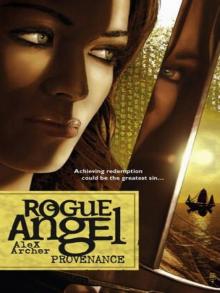 Provenance
Provenance Blood Cursed
Blood Cursed Fury's Goddess
Fury's Goddess The Spirit Banner
The Spirit Banner Footprints
Footprints The Pretender's Gambit
The Pretender's Gambit Rogue Angel: The Lost Scrolls
Rogue Angel: The Lost Scrolls Staff of Judea
Staff of Judea Rogue Angel 55: Beneath Still Waters
Rogue Angel 55: Beneath Still Waters The Mortality Principle
The Mortality Principle Warrior Spirit
Warrior Spirit Paradox
Paradox Tear of the Gods
Tear of the Gods Forbidden City
Forbidden City River of Nightmares (Rogue Angel)
River of Nightmares (Rogue Angel) Rogue Angel: The Secret of the Slaves
Rogue Angel: The Secret of the Slaves Destiny
Destiny Rogue Angel 51: The Pretender's Gambit
Rogue Angel 51: The Pretender's Gambit Celtic Fire
Celtic Fire Rogue Angel 54: Day of Atonement
Rogue Angel 54: Day of Atonement Day of Atonement
Day of Atonement Rogue Angel: Gabriel's Horn
Rogue Angel: Gabriel's Horn Grendel's Curse
Grendel's Curse The Matador's Crown
The Matador's Crown Rogue Angel: The Chosen
Rogue Angel: The Chosen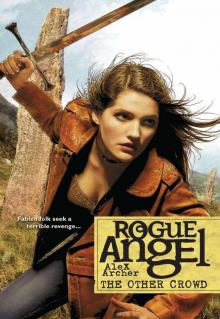 The Other Crowd
The Other Crowd Seeker’s Curse
Seeker’s Curse Rogue Angel 52: Death Mask
Rogue Angel 52: Death Mask The Golden Elephant
The Golden Elephant Blood Cursed (Rogue Angel)
Blood Cursed (Rogue Angel) Celtic Fire (Rogue Angel)
Celtic Fire (Rogue Angel)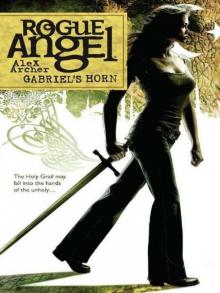 Gabriel's Horn
Gabriel's Horn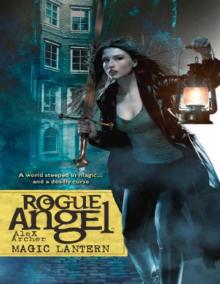 Magic Lantern (Rogue Angel)
Magic Lantern (Rogue Angel) God of Thunder
God of Thunder Clockwork Doomsday
Clockwork Doomsday The Bone Conjurer
The Bone Conjurer Treasure of Lima
Treasure of Lima The Soul Stealer
The Soul Stealer The Dragon’s Mark
The Dragon’s Mark Restless Soul
Restless Soul Rogue Angel: God Of Thunder
Rogue Angel: God Of Thunder Rogue Angel 49: The Devil's Chord
Rogue Angel 49: The Devil's Chord Death Mask
Death Mask Rogue Angel 46: Treasure of Lima
Rogue Angel 46: Treasure of Lima Swordsman's Legacy
Swordsman's Legacy The Oracle's Message
The Oracle's Message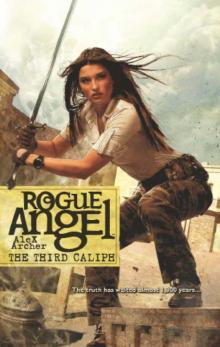 The Third Caliph
The Third Caliph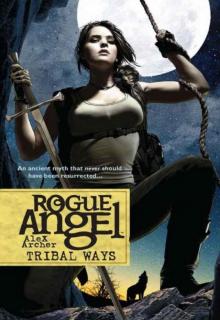 Tribal Ways
Tribal Ways Phantom Prospect
Phantom Prospect Rogue Angel 50: Celtic Fire
Rogue Angel 50: Celtic Fire Library of Gold
Library of Gold Rogue Angel 53: Bathed in Blood
Rogue Angel 53: Bathed in Blood Sacred Ground
Sacred Ground The Devil's Chord
The Devil's Chord Serpent's Kiss
Serpent's Kiss The Vanishing Tribe
The Vanishing Tribe Sunken Pyramid
Sunken Pyramid Sunken Pyramid (Rogue Angel)
Sunken Pyramid (Rogue Angel) City of Swords
City of Swords Bathed in Blood
Bathed in Blood The Lost Scrolls
The Lost Scrolls The Babel Codex
The Babel Codex Mystic Warrior
Mystic Warrior Eternal Journey
Eternal Journey Beneath Still Waters
Beneath Still Waters Solomon's Jar
Solomon's Jar Beneath Still Waters (Rogue Angel Book 55)
Beneath Still Waters (Rogue Angel Book 55) Cradle of Solitude
Cradle of Solitude Secret of the Slaves
Secret of the Slaves River of Nightmares
River of Nightmares Polar Quest
Polar Quest False Horizon
False Horizon